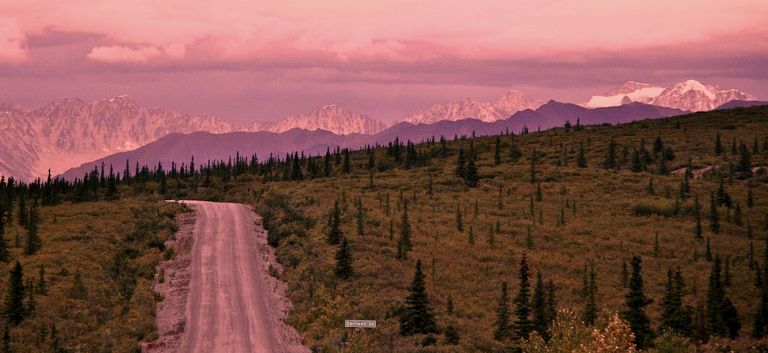“The greatest justification for travel is not self-improvement but rather performing a vanishing act, disappearing without a trace. As Huck put it, lighting out for the territory.”
About nine months ago, I disappeared. I went to Alaska and never really came back.
I wasn’t expecting to go rogue. As a lifelong nomad, I had gone through the seasons of wanderlust enough times to feel confident in my ability to anticipate—and then navigate—the invariably rough transitions and existential crises that arise in the spaces between flight and reentry. My restlessness had joyously pulled me across all seven continents, and perhaps I had grown a bit cocky, a bit too sure that I had seen enough horizons that they had lost their capacity to leave me fundamentally altered.
So last summer when I packed up my bicycle and headed out to do a 900 mile ride into Denali National Park by way of the foothills of the central Alaskan Range, I expected that I would spend a lot of time eating spoonfuls of Nutella and grinning maniacally while being cold and wet in very beautiful and very remote places. And then I would then come back to my city life feeling renewed and ready to get back to the work of being an artist.
But instead, everything changed.
I am not sure how best to explain it other than to say that I recalibrated my internal clock to measure itself against geologic time. I was limping when I left Seattle, licking my wounds from the fallout of a particularly ugly breakup. My anger was contorting me into something that I did not want to be, and I left holding within me the silent prayer that I might find the space in which to heal. Instead, I found a peace much larger than the one I had been looking for. Spending a month alone with mountains and glaciers and no rhythm save the cadence of my own pedaling freed me from any sense that anything human could possibly be the slightest bit important, and I have felt the most wonderfully anarchic freedom ever since.
But that peace took a lot with it, and I have not been able to find a way—or a desire—back into the life I was living before. My belief in the significance of a cultural landscape collapsed when confronted by the humbling silence of an actual landscape. It has not come back; I do not think I want it to.
I don’t know what this means for Big Questions. I ask myself How are we remembered? and the only answer I can give is: we aren’t.
Legacy requires a belief in the significance of one’s own life, and that is something that I let go of somewhere in those mountains. It was too heavy, so I put it down. When I first returned from Alaska, I (sporadically, I concede) posted mini-essays on The Seen on the topic of people who disappeared: Amelia Earhardt swallowed by the ocean; Chris McCandless dying of starvation in the shell of a derelict bus in the Alaskan wilderness; Jack London enveloped by the weight of his own self-created myth.
I wanted to explore the impulse to disappear, to test it against the question of legacy and see how the two related. At their heart, maybe both disappearance and legacy are about seizing control of our own deaths. Disappearance approaches the question of mortality by making the self preemptively forgotten: it claims erosion as active choice, thus stripping it of its terror. And legacy fights the finality of death by attempting to create something that sustains, that can stand as a proxy even after the self is gone.
So is it possible to reconcile these two approaches? I do not think it is. One is about bolstering the self; one is about intentionally giving it away.
Whatever happened to me in Alaska changed my own perspective such that the question How are we remembered? became liberatingly irrelevant. But I have been fascinated by that irrelevance, and have spent the last nine months unpacking how that simple shift has altered everything about the way I move through the world.
Next week, I disappear again. I am heading back up to Alaska and will be in Denali National Park with no phone or internet until mid-September. I have no idea where my mind will wander up there, but I am sure I will continue to think about disappearance and memory, and will check back in when I return.
“May it take millennia of rain to wear away our bones,
Centuries of slow, voluptuous letting go.”
Above photo: The Old Denali Highway


